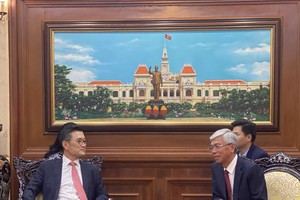Chinese state-owned firms will be welcome to buy Australian government assets in an upcoming sale worth more than Aus$40 billion (US$42 billion), a top official said Tuesday amid calls for broader ties.
Barry O'Farrell, premier of New South Wales state, told The Australian newspaper there would be a suite of assets open to Chinese bids when the official "Infrastructure NSW" portfolio is unveiled in September.
"When I was here last year there was interest in investing in infrastructure and whatever assets we might have up for sale," he said from the southern Chinese city of Guangzhou.
O'Farrell is in China holding a week-long investment roadshow ahead of the release of the Infrastructure NSW report, which will detail government assets for sale which he estimated to be worth at least Aus$40 billion.
"There is an anticipation (in China) about the Infrastructure NSW report," he said, adding that current rules would permit bids on items including electricity infrastructure and ports.
"I have said you could spend $40 billion in Sydney without touching the sides."
The move follows a controversial speech by Australia's opposition leader Tony Abbott in China last week describing investment by foreign governments as "rarely" in Canberra's interest.
Prime Minister Julia Gillard and Foreign Minister Bob Carr condemned the remarks as "dangerously dumb" and endangering Australia's economic security.
Trade Minister Craig Emerson welcomed O'Farrell's stance, saying he "actually understands the value of foreign investment including from state-owned enterprises".
China's deputy ambassador to Australia, Xue Bing, rebuffed Abbott's remarks at a university forum in Canberra this week where he argued for broader links between the top trading partners.
"China and Australia are highly complementary in natural resources, industrial structure and scientific development," Xue said, according to the Australian Financial Review.
"Facts prove that Chinese investment in Australia is good for the Australian economy and good for our win-win cooperation," he added.
China is Australia's number-one export market and its top source of imports, with two-way trade worth Aus$113.7 billion (US$120 billion) in 2011, 23.2 percent of Australia's total.
Shipments of coal and iron ore to feed fast-industrialising China's steel mills helped Australia dodge recession during the financial crisis, and Canberra has signalled interest in expanding ties into other sectors.
The two nations were reported in May to be in talks about direct Chinese investment to develop northern Australian farms focused mainly on beef, sheep, sugar and dairy, in a bid to boost food security.
But the relationship is not without difficulties -- Canberra banned telecoms giant Huawei from bidding for broadband contracts on national security fears earlier this year, and several mining takeovers have failed on similar grounds.
























